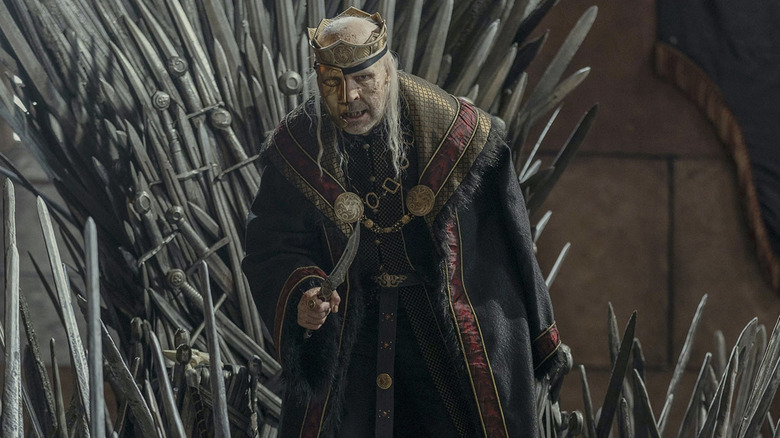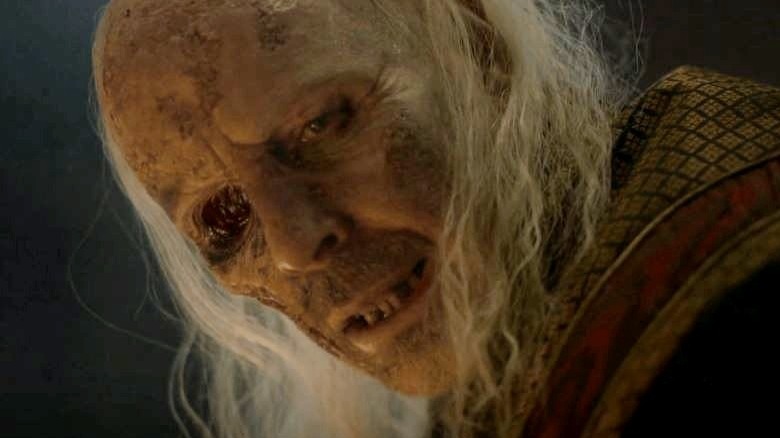How Paddy Considine Was Transformed Into The Decaying King Viserys For House Of The Dragon
Viewers of "House of the Dragon" have watched the alarming decline of King Viserys (Paddy Considine) over the course of the first season. With the show's time jumps, there is a striking visual progression as disease takes hold and breaks down the doomed King's body. Innocuous scars here and there eventually turn Viserys into a walking corpse of man, with missing limbs and the complete destruction of one side of his face.
To create the various stages of Viserys' wasting disease, prosthetics designer Barry Gower and his team worked hard researching and then developing the evolving looks we see onscreen. In an interview with Variety, Gower breaks down every single step in how they tackled this ambitious project. First up was the research, which involved looking into various real-life diseases to see what to pull from:
"We researched various flesh-eating disorders. Necrosis, leprosy, all kinds of horrible references. Lots of interesting shapes, colors and ulcers. They could give us a good indication for textures, colors, glosses, how dry things would be. It's very grounded in the real world of horrible diseases."
With seven different stages to execute, the team had their work cut out for them — especially in later episodes, which required a body double to show Viserys utterly wasting away.
It's just a flesh wound
In later episodes of "House of the Dragon," there was a lot more work for Gower and his team to tackle. To capture the wasted quality of Viserys' body, a body double was brought in to physically capture the gaunt, bony transformation the rotting king had undergone over two decades. Gower told Variety:
"For one or two scenes, we had a body double who was very slender and had a very pronounced bone structure ... We shot some of the scenes with sores on his back, necrosis on his collarbone and shoulders. Then we shot the same scene with Paddy, and VFX were able to manipulate Paddy's face onto the double's body."
There were tools at Gower's disposal in terms of getting both Paddy and the double transformed. "We had little silicone molds that you can press onto the skin and peel them off. We had cheek appliances, little sores that were shaved into Paddy's own beard and his hairline. With the silicone bald cap, we could recede the hairline and had sores in there." That said, they had double the work in getting Considine and the double made up.
The prosthetics used in later episodes took about five hours to apply on the actors. With the team working on both Considine and the double, there was a lot to get done. By episode 8, the team had to embrace VFX to tackle elements of the transformation they could not do practically.
A job for VFX
While great strides have been made in prosthetics and makeup, there are still limits to what can be achieved. In the case of King Viserys' final transformation, achieving the effect of a missing eye and the deterioration of half his face meant relying on a mixture of practical and VFX for proper execution. This allowed for Gower and his team to achieve the effects they wanted without compromising the hard work they'd done.
"We knew we wouldn't be able to achieve that final look completely practically, because we would have all these holes in Paddy's head," Gower explained. "We had fully prosthetic make-up that covered all of Paddy's face for those scenes. We had areas that were painted green for the visual effects department to remove in post. They also tucked in the build of Paddy's face, so they made him a lot more slender and gaunt."
The transformation of Viserys through the various stages of his disease was executed extraordinarily well. With seven stages of the diseases plotted out, the team was able to build on what they had already established with great precision, even with the increased workload later in the season. Coupled with Considine's performance, by the time we reach Viserys' final breathing moments, it's difficult not to hope that the character finds peace from his suffering.


